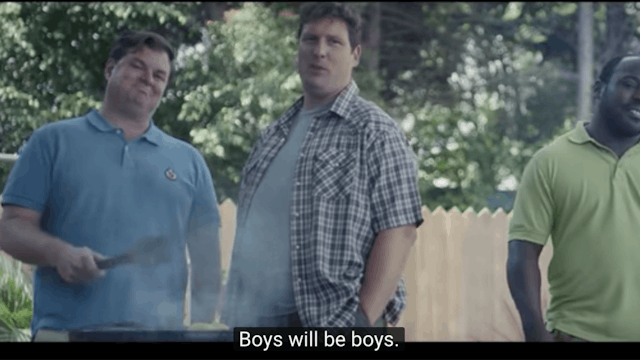As A Dad Raised With Toxic Masculinity, This Is Why The Gillette Ad Is So Important

You know that moment in the Gillette anti toxic masculinity ad, where one boy is beating up another in front of a group of men around a grill and the man leans back, smiles, and says, “Boys will be boys”?
That moment, right there, really hit home for me because the reality was, back in the day, when I was a boy, I was the one with my back to the grass.
I was the one taking hits to the face for being small, or different, or awkward, or flat out not as tough as the other kids. This happened more than once, or twice, or three times as a child. I got picked on a lot at that age because I was different. Because I wasn’t good at sports, and my father, well… he wasn’t around. I’ve heard a lot of people say that this ad is over dramatizing masculine stereotypes, but I can say, with 100% sincerity that I saw a lot of resemblance to my youth.
Every time something like that happened, I’d look to the men in the room and they’d do nothing but give me that same look that the dad leaning over the grill gave that said something to the tune of, “Learn to fight your own battles” or “Tough up boy, the world is only going to get worse” or the one I hated the most “Stop being a pussy.”
And do you know what happened? I got my ass kicked because I was a small boy who grew into a small man. Nothing I could do about it. None of it made me tougher. It just made me feel like the world was against me, which is a horrible feeling, I must say.
I will admit, there was a time when I tried hard to fit into that stereotypical masculine mold, and I ended up becoming something that I’m not, and act in a way that I am ashamed of to this day. It wasn’t until I was in my late-20s that I started to realize there was something fundamentally wrong with the way men treat each other, and suddenly I became that guy rolling up the passenger window when my friends tried to cat call a woman. I became the guy who broke up fights and told young men to shake hands because punching it out isn’t the way the real world works. I became the dude who said, “Just because she didn’t say ‘no’ doesn’t mean ‘yes.’”
And last summer, when my 11-year-old son’s soccer coach pulled me aside after practice to tell me Tristan started crying so he sat out for a bit, I didn’t give him the “man up” talk like I know the coach wanted me to. Instead, I bought him an ice cream cone and told him to tell me everything. Then we sat at McDonalds and talked about sports, and frustration, and how crying is normal. We talked about how playing sports isn’t about being the best, but about growth. It’s about showing up and trying, really trying. It’s about gaining skills, and how your whole life will be like this: sports, school, work, family.
Then I asked him if he was going to quit soccer. He took a bite of his cone and said, “No. I’m going to keep trying.”
What I did in that moment was everything I wished men had told me growing up, and this is exactly what the Gillette ad was trying to show all men. Because the fact is, there are a lot of fathers out there just like me, trying to remove all the “toughen up” clutter we were fed as kids so we can focus on being more understanding, compassionate, and respectable humans. And this, right here, is what made the Gillette ad so important.
It’s not an attack on masculinity. What it’s doing is showing what masculinity is becoming, and frankly, in my opinion, what it always should have been. It’s an attempt to help men be better humans, with empathy and understanding. It’s trying to get men to pause and question who and what they are, and decide if their actions are actually making the world a better place. Because let me tell you some facts: Cat calling a woman has never made a life better. Calling another man a pussy has never made that man stronger. Talking over a woman has never generated new and better ideas. And kicking someone’s ass has never garnered worthwhile conversation and compromise.
As a father, I want my son to grow up and understand that women are to be respected, heard, understood, and seen as equal partners in the journey of life. I want him to understand that words, logic, heart, and intelligence have always made more of an impact in society than fists, and that his emotions are valuable and warranted and needed to sustain his own mental health. None of what I am describing is shameful or degrading to men. It is simply what men should be, and all that Gillette did was put it up there on the screen. They gave it a platform, and as a father trying to break the cycle of toxic masculinity, I couldn’t be more grateful.
This article was originally published on